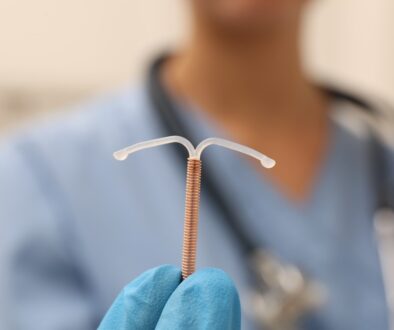When to Talk to Your Daughter About Birth Control
It’s one of the most difficult conversations you’ll have with your daughter—but it’s also one of the most important.
We feel that conversations about consent, respectful relationships, and safer sex are important regardless of your child’s gender. This blog will be addressing many hormonal forms of birth control; therefore, we will be focused mainly on how to counsel your daughters.
Discussing sex and birth control may be awkward, but it’s vital for your daughter to have the information she needs to make informed decisions. It’s equally important that she knows she can turn to you or to our health care team at Chapel Hill OBGYN for reliable answers instead of turning to her peers or unreliable internet information.
Over half of all teens have had sex by the time they reach 18. Teen births are generally on the decline in the US, but still, more than 200,000 infants are born to teenage mothers.
However, studies from the Centers for Disease Control also show that of the teens who are sexually active, 90 percent used birth control, with the most common forms being the pill and condoms.
But the question remains: When should you have the conversation with your daughter about birth control for teens? We’ve provided some information here we think will help.
When to Discuss Birth Control With Your Daughter
If your teen asks you questions about sex, that’s a good cue to have a discussion with them about safer sex and birth control. Likely, she has other questions as well, and it would also be a good opportunity for you to emphasize that she can come to you with any problem or question she may have.
While the average age when teens first have vaginal intercourse is around 17, it’s important to have the conversation with your daughter much earlier than this.
We encourage parents to start talking about body changes, respectful/healthy touch, respecting “no” – prior to puberty. Many experts feel like starting around 8-9 years old is the right time to begin these types of talks, perhaps getting more explicit at age 12-13.
Emphasize that Having Sex—or Not—Is a Choice
Be sure to maintain open and honest communication with your teen, and make sure she understands that having sex is her choice—she shouldn’t be pressured to do it because her friends are or because her partner wants it.
By letting her know that you are listening, she will be more likely to come to you with problems and questions.
Of course, we are always available to answer any questions your child has about sexuality, sexual health and birth control.
What Are the Best Birth Control Options for Teens?
First, we want to be clear that we do not think there is any one type of birth control that is appropriate for everybody. The kind of birth control needed for teens is decided based on each patient’s individual situation.
We feel that the fewer steps required by the patient to take, the easier it is to be compliant. For example, a method placed once a month is easier than one used once a week, and a weekly method is easier than a daily method. (This is true for teens as well as adults.)
That being said, we do believe that the following are the best options to consider:
Implants
These are about the size of a match (4cm) and we carefully insert them under the skin of the upper arm. They utilize hormones to prevent pregnancy and are effective for up to four years.
IUDs
We’ve explored many of the benefits and frequently asked questions about IUDs in an earlier blog post, which explains their effectiveness and convenience.
An IUD is a small, T-shaped device about the size of a quarter that is inserted into the uterus. Depending upon the type of IUD that you have, they may use either copper or hormones to prevent pregnancy. They can be effective for 3-10 years.
IUDs are very effective; there is less than one pregnancy per 100 women in a year for those who use IUDs. An IUD can be removed when a woman decides she wants to have children.
The Pill
While the pill is effective, it depends upon your daughter being able to take it regularly without skipping days. For some teens, this may be hard to remember.
Many may use the pill to ease painful periods or help with acne. It’s also easier to stop just in case the patient has side effects with it.
Other Benefits of Birth Control
Preventing an unplanned pregnancy isn’t the only reason your daughter may benefit from birth control. In certain cases, hormonal contraception, like the types mentioned above, can help teens who have severe cramps and very heavy bleeding during their periods.
In some instances, it can actually reduce the chances of developing ovarian cysts and help control acne.
Are There Any Side Effects to These Forms of Birth Control?
These forms of birth control are very safe and have been used effectively on millions of women with very few side effects. Usually, when there are side effects, they are mild.
For implants, your daughter might experience:
- Abdominal discomfort
- Mild back pain
- Changes in her period patterns
- Dizziness
- Headaches
- Mood swings
For an IUD, side effects may include:
- Cramping
- Irregular bleeding
- Headache
- Tender breasts
For the pill, certain women may have side effects that include:
- Slight nausea
- Lighter periods
- Mood changes
- Mild headache
If you have any questions or concerns about these side effects, please contact us. We are here for you and glad to answer any questions you have.
Tell Your Teens How to Protect Themselves from Sexually Transmitted Diseases
While the methods listed above are effective for birth control, they do not protect against sexually transmitted diseases. Your teen may need to know about condoms and how to use them effectively.
You should also discuss that you can get sexually transmitted infections through oral and anal sex.
Not Sure Where to Begin? Talk to Us!
We are very fortunate to have treated several generations of women in the same family. We have served mothers, their daughters and grandmothers.
We want your daughter to have the accurate information on teen birth control she needs in order to prevent an unplanned pregnancy and to keep her safe from sexually transmitted infections.
We understand that often, it can be difficult to even know where to start when you need to have this conversation.
That’s okay– we can provide talking points, and we’re always happy to meet with your daughter so she can ask us questions as well. Our first priority is safeguarding your health and ensuring that you receive the quality care you deserve in a compassionate environment.
If you have any questions or concerns, we encourage you to schedule an appointment with us.




